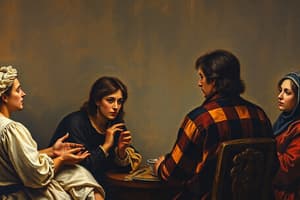Podcast
Questions and Answers
Which sociologist is known for the Looking-Glass Self Theory?
Which sociologist is known for the Looking-Glass Self Theory?
The Generalized Others refers to people who have a direct influence on our identity.
The Generalized Others refers to people who have a direct influence on our identity.
False (B)
What does the Social Self Theory emphasize regarding personal identity?
What does the Social Self Theory emphasize regarding personal identity?
It emphasizes that personal identity is influenced by social interaction and cultural norms.
In Cooley's Looking-Glass Self Theory, the three stages are appearance, interpretation, and ______.
In Cooley's Looking-Glass Self Theory, the three stages are appearance, interpretation, and ______.
Signup and view all the answers
Match the following concepts to their descriptions:
Match the following concepts to their descriptions:
Signup and view all the answers
Which of the following accurately describes the process of role-taking?
Which of the following accurately describes the process of role-taking?
Signup and view all the answers
Looking-Glass Self Theory involves only one stage.
Looking-Glass Self Theory involves only one stage.
Signup and view all the answers
Name one influence on the Social Self according to George Herbert Mead.
Name one influence on the Social Self according to George Herbert Mead.
Signup and view all the answers
Study Notes
Cooley's Looking-Glass Self Theory
- Describes self-image development based on perceptions of how others view us.
- Comprises three stages:
- Appearance: Individuals consider how they appear to others.
- Interpretation: Individuals reflect on how they believe others judge them.
- Self-feeling: Results in emotional responses that shape self-perception.
Mead's Social Self Theory
- Emphasizes the role of social interaction and cultural norms in forming personal identity.
- Introduces the concept of Role-taking where individuals learn to see themselves through others’ perspectives.
- Discusses two key influences:
- Significant Others: Close individuals (e.g., parents, siblings, friends) shaping one’s self-identity.
- Generalized Others: Represents society's broader norms and expectations that individuals internalize to form identity.
Studying That Suits You
Use AI to generate personalized quizzes and flashcards to suit your learning preferences.
Description
Explore the concepts of Cooley's Looking-Glass Self Theory and Mead's Social Self Theory in this quiz. Understand how self-image and identity are shaped through perceptions and social interactions. Dive into the stages of self-perception and the influences of significant and generalized others.




